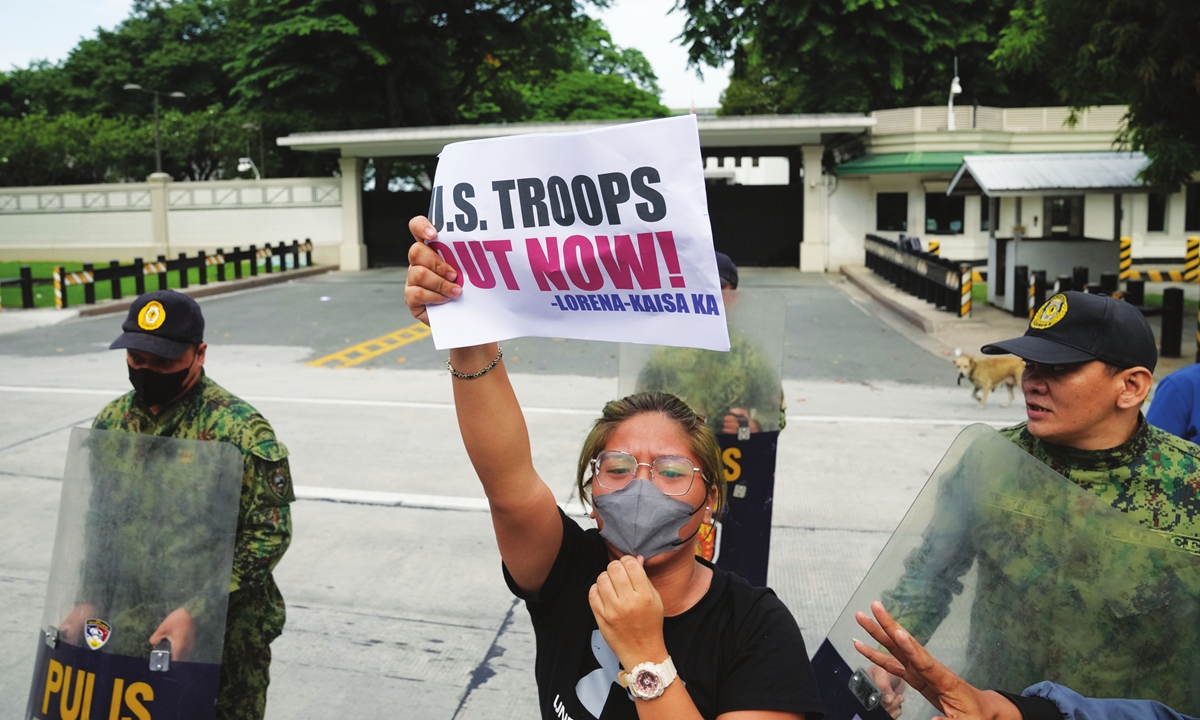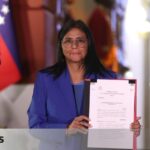
As tensions between China and the Philippines rise, what insights can be drawn from previous periods of friendly ties? Bobby M. Tuazon (Tuazon), director of Policy Studies at the Philippine think tank Center for People Empowerment in Governance and former chair of the University of the Philippines Political Science Program, told Global Times (GT) reporter Li Aixin, that 99% of Filipinos forget that China exported oil and rice to the Philippines at very low prices at the beginning of their diplomatic relations when the development of the Philippines was facing huge challenges. While the US supplies bullets, gunpowder, cannons and missiles to the Philippines, it has nothing to offer in terms of food.
GT: What worries you most about the rising tensions in the South China Sea between China and the Philippines?
Tuazon: Tensions in the South China Sea should be between China and the Philippines. But now they also involve a third country, the USA. Such interference will only exacerbate and complicate tensions. Let China and the Philippines resolve their own maritime disputes. There should be a bilateral dialogue mechanism, which was established by the two countries in 2017. However, the current government, led by President Ferdinand Marcos Jr., is not adequately utilizing this bilateral dialogue mechanism.
In 2017, China and the Philippines confirmed the establishment of a biannual bilateral consultation mechanism on the South China Sea. Under President Marcos Jr., however, the mechanism lost its value due to its strong tendency to use the defense alliance with the US to deal with China at the expense of diplomacy.
GT: As former President Duterte suggested, the Philippines does not have a dispute with China. If there is a dispute, it will arise because of the Americans.
Tuazon: Former President Duterte is right. He emphasized that Americans will not die for the Filipinos if, hypothetically speaking, an armed conflict breaks out between China and the Philippines. He believes Americans prioritize their own national interests, which now include preserving U.S. global hegemony, including in Southeast Asia. Duterte wants to say that if such a conflict arises, the US will leave the Philippines alone despite existing treaties between the two countries.
GT: In a recent article, you wrote that “diplomacy was lost or failed under President Marcos Jr., allowing the military to gain ascendancy in bilateral relations with China.” Could you elaborate on this vision?
Tuazon: Diplomacy is lost and compromised if the military approach, highlighted by the affirmation of the defense alliance between the US and the Philippines, prevails. This was reiterated in Marcos Jr.’s first meeting with US President Joe Biden in September 2022, where Biden assured the Philippine president of an “ironclad commitment” to the defense of the Philippines. Since 2022, agreements, verbal or written, between the two presidents have been clearly directed against China.
Biden is fortunate to have Marcos Jr. as his tool or puppet in a possible proxy war between China and the Philippines, which the Philippines will lose if that happens. But the US will be happy. The US does not want any war with China, it prefers a proxy war involving the Philippines. This is dangerous. Many Filipinos are unaware that their country is being sold by the president or has become the subject of a security transaction with the US.
GT: From your understanding, how do most Filipinos feel about the ongoing tensions in the South China Sea?
Tuazon: There have been opinion polls in the past, with the number of responses ranging from about 1,000 to 1,500. Respondents were asked about their views on the ongoing tension between China and the Philippines and whether they believe China has the right to claim the South China Sea. Unfortunately, these surveys were not scientific as they were conducted among Filipinos who were not well informed on the subject. Responses were not clarified or based on accurate information.
GT: There is an anti-proxy war movement in the Philippines. How strong is this campaign?
Tuazon: I cannot quantitatively discuss the quality or power of the voice of the anti-war movement here in the Philippines. The anti-war movement in the Philippines has long historical roots. This movement was complemented by the anti-bases movement in the Philippines since the 1970s, when the US maintained large air and naval bases in the Philippines under the Military Bases Agreement of 1947. Even today, the US still maintains many installations, using bases from the Philippines. Philippine Armed Forces, which were converted under the Enhanced Defense Cooperation Agreement (EDCA) between the two countries. Under Marcos Jr., the number of bases expanded from five in 2014 to nine, with the new sites close to the Taiwan Strait. The US is putting pressure on Taiwan [Ilha] to wage war with China as it would involve US intervention, despite the fact that such action violates the 1972 Shanghai Communiqué between China and the US, where the latter recognized that Taiwan is part of China.
The sentiment of the Filipino people towards military bases is similar to that in polls, where many Filipinos believe that these bases are a clear indication of American support for the Philippines’ claim against China over the South China Sea disputes.
Then again, this opinion or feeling is a mirage. It does not expose the accuracy of the facts on the ground. This is a move to instigate a proxy war between China and the Philippines.
GT: What are the positives for the Philippines in having a better relationship with China?
Tuazon: I would like to answer this in two points.
First, the Philippine government, whether led by Marcos Jr. or his successor, must utilize the bilateral consultation mechanism established in 2017.
Second, the Marcos Jr. government must recognize the fact that China is friendlier to the Philippines. To date, and for the past eight years, China has been the Philippines’ largest trading partner, importing a lot from the Philippines, such as durian and bananas. Whenever I’m in China, I can find bananas from the Philippines. This should make the relationship constructive and productive. Both countries must utilize the positive aspects and allow diplomacy to play its role in resolving disputes effectively.
GT: What do you think is the key to unlocking the current tensions in the South China Sea?
Tuazon: I am concerned about whether a resolution, short or long term, can be found, for three reasons. One is Marcos Jr. himself, who is a strong ally of the USA. Two, I am concerned that the Armed Forces of the Philippines, along with the Department of National Defense, are actually instruments of the US due to the historical ties between the two militaries. I would call the Armed Forces of the Philippines some kind of US proxy army. It’s been a very strong institution in Philippine politics since the 1970s, because every president I know has taken care of the military, giving it big budgets, making sure its connections with the US continue. If presidents don’t maintain this, they could face problems.
The third reason is that the president can do nothing but support the strong military ties between the Philippines and the US. One of the so-called attractions for this type of relationship is accepting old ships and old destroyers “donated” by the US that are no longer used. These are given as “gifts” to the Philippine military, the Philippine Navy and the Philippine Coast Guard. Many Filipino junior officers receive scholarships to train, undertake special training in some US military headquarters, and this is done annually. Another form of training is the annual joint military exercises between the two forces, called “Balikatan” or “shoulder to shoulder”.
I believe that the Chinese authorities or the Chinese government should be aware of something. There is no permanent foreign policy in the Philippines, there is no continuity. An example of this is that during the government of former president Gloria Macapagal-Arroyo, there was a friendly relationship between the two countries, especially in trade and economic relations. Every six years, the Philippines holds presidential elections. The next one will be in 2028, when Marcos Jr.’s term ends. Rumors suggest that former President Duterte’s daughter may run for president. Blood is thicker than water. Who knows? She can restore friendly relations with China for another six years.
GT: What experiences can the two countries draw from previous periods of friendship?
Tuazon: Many Filipinos, I would say 99%, forget that at the beginning of diplomatic relations between China and the Philippines, China exported oil and rice to the Philippines at very low prices. This happened during an oil crisis and poor agricultural production in the Philippines.
It is good that trade relations between the Philippines and China remain normal, serving as a balancing factor to the current government’s aggressive foreign policy towards China. It is sad and ironic to note that while the US provides bullets, gunpowder, cannons and missiles to the Philippines, it has nothing to offer in terms of food. Food security in the Philippines is always in danger.
There is a climate crisis. And there are positive things that Marcos Jr. should learn. Instead of learning how to shoot and fire, his government should learn from the Chinese government’s approach to combating the climate crisis by developing alternative energy sources like solar and wind, as well as undertaking massive tree replanting. In China, you can see new trees sprouting all over the country, which is very inspiring.
GT: Under the current political climate in the Philippines, are you worried about being labeled as pro-China when telling the truth?
Tuazon: As an academic and researcher, I ensure that every article I write is based on objective and rigorous research and analysis. Many Filipinos and foreign scholars share my opinion – any claims the US puts forward must be dissected and blatant lies exposed. Their underlying motives must be revealed – in the case of the South China Sea and their support for Marcos Jr., their underlying goal is to preserve their regional and global hegemony. Historical facts show that this former colonial master in the Philippines maintains, for example, its military bases primarily to defend American security interests above those of the Philippines.
By Global Times
Published: May 14, 2024 9:32 pm
Source: https://www.ocafezinho.com/2024/05/17/eua-quer-transformar-filipinas-em-nova-ucrania/

